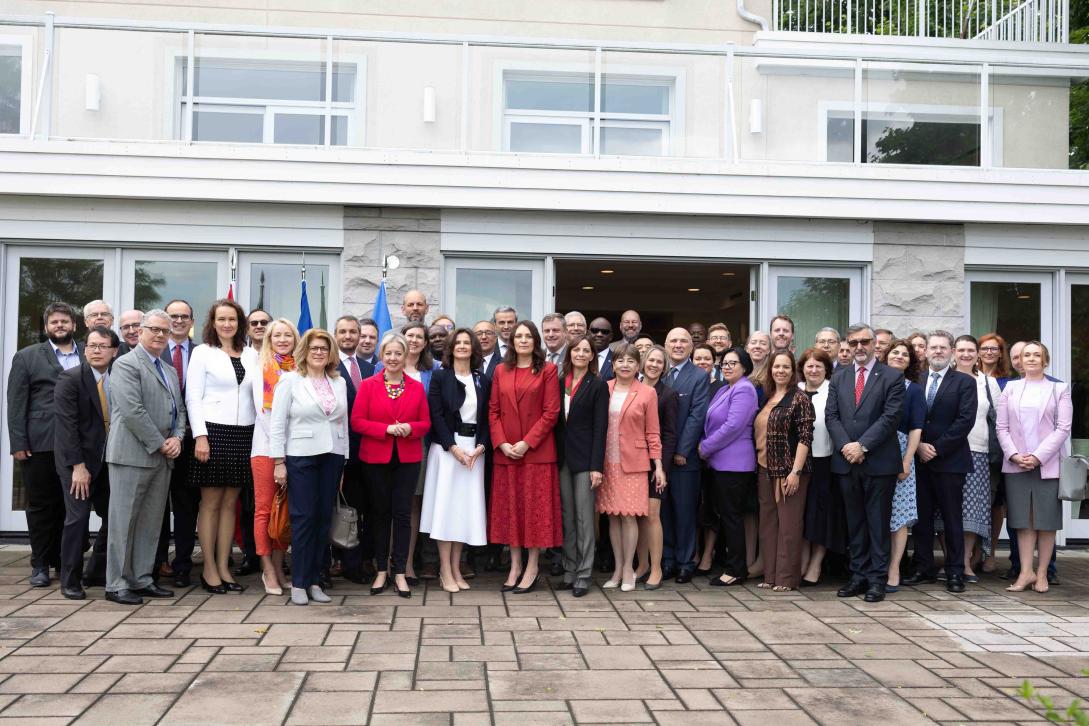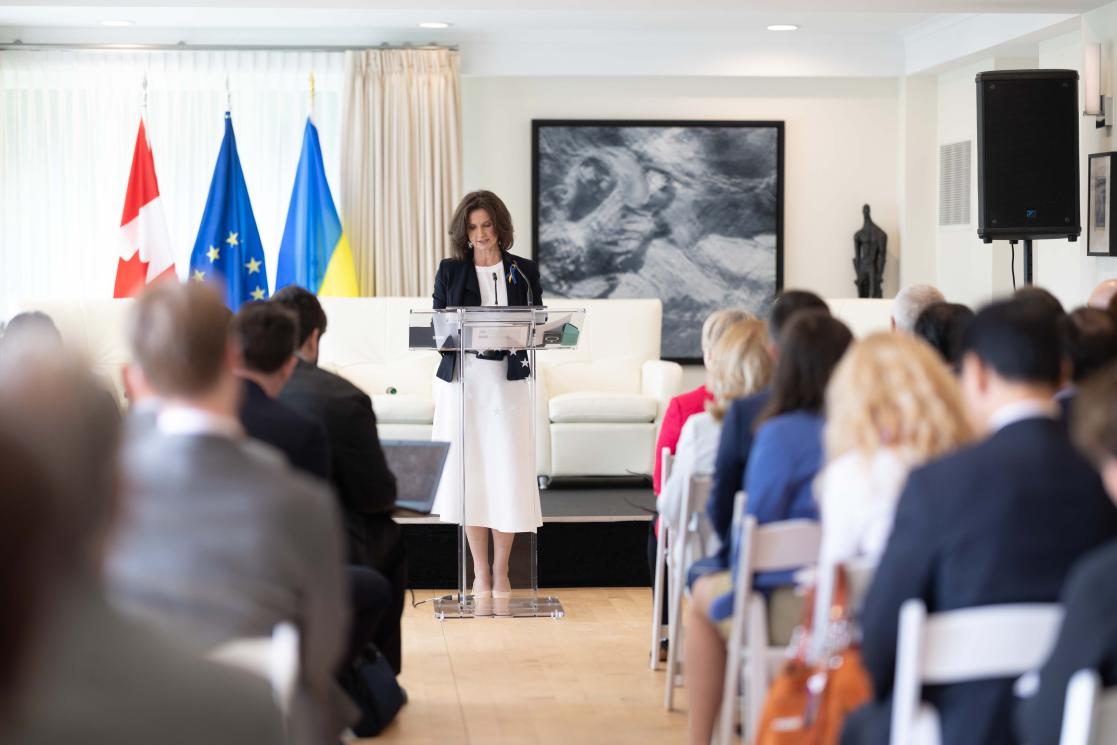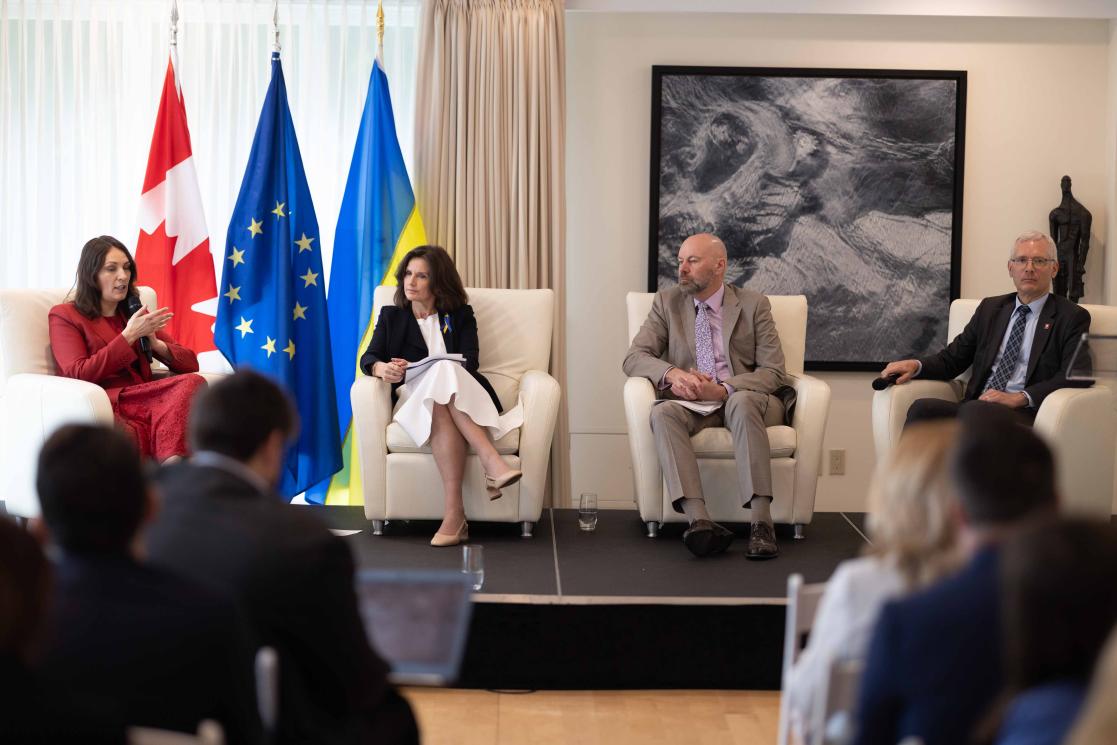Ambassadors from around the world gathered at the Residence of EU Ambassador to Canada in support of the Summit on Peace in Ukraine

(Main image: Assistant Deputy Minister at Gobal Affairs Canada Sandra McCardell, EU Ambassador Melita Gabrič, and Ukraine Ambassador Yuliya Kovaliv together with participants of the “Road to the Summit on Peace in Ukraine” event.)
This meeting aimed to build global support and generate momentum for the Summit. Benefitting from high-level participation from the Canadian government, the Ukrainian Ambassador to Canada Yulyia Kovaliv and the Swiss Ambassador to Canada Olaf Kjelsen, the event highlighted the importance of a united effort to support Ukraine and a process that leads to comprehensive, just and lasting peace.
Ensuring broad international support for the Summit and the peace process
There is no country in the world who has not felt the impact of Russia’s war of aggression against Ukraine […] We are in this war together, hand in hand.
Yulyia Kovaliv, Ukraine’s Ambassador to Canada
We want to talk peace and we want to engage the world in this discussion. It is important to involve Global South partners
Stephen de Boer, Foreign and Defence Policy Advisor to the Canadian Prime Minister
Intervening participants underlined the far-reaching consequences of the war and the role Global Partners can play in limiting the effects of a conflict that threatens global food security, economic stability and the rules-based international order. The broadest possible support for the Summit and for a future peace process is essential to reassure Ukraine and to inspire a diplomatic solution that respects international law. Ukraine needs the strength of the entire international community to end the war in terms based on the UN Charter.
A Summit to promote a roadmap to peace
This is a Summit of the international community […] It aims to bring together not only Friends of Ukraine, but friends of the world order. [..] It is about inspiring the peace process and producing practical steps forward.
Olaf Kjelsen, Switzerland’s Ambassador to Canada
The event demonstrated the widespread support among diplomats in the audience for Switzerland's initiative, requested by Ukraine, to organize a Peace Summit. Intervening participants shared the common understanding that the Summit is not a negotiating forum, but a high-level conference to promote a joint vision of a possible road towards peace. It will be the occasion to discuss at the highest political level, for the first time, how both parties to the conflict could be engaged in a future peace process.
The Summit will also be a platform to discuss concrete topics of global interest such as nuclear security, food security, freedom of navigation, and the return of prisoners of war, children, and civilians. Given the global ramifications of the conflict, it is crucial to gather perspectives from diverse regions of the World and benefitting from the experience of all the Global Partners who are willing to engage.

European Union (2024)
(Image: EU Ambassador Melita Gabrič speaks about the importance of presenting a united front in support of Ukraine.)
Key elements of the Summit
Following up on Ukraine’s request, and in close partnership with President Zelenskyy, Switzerland invited 168 heads of states and governments to a Summit on Peace in Ukraine on 15-16 June.
The overarching objective of the summit was to inspire a future peace process. To achieve this, the summit aimed to:
- Provide a platform for dialogue towards a comprehensive, just and lasting peace for Ukraine based on international law and the UN Charter;
- Promote a common understanding of a possible framework to reach this goal;
- Jointly define a roadmap on how to involve both parties in a future peace process.
A comprehensive, just and lasting peace, grounded in the core principles of the UN Charter
We want peace, but we want it just and long lasting. The anchor of the Peace Formula is the UN Charter.
Yulyia Kovaliv, Ukraine’s Ambassador to Canada
Canada is committed to the sovereignty and territorial integrity of Ukraine.
Heidi Hulan, Assistant Deputy Minister at Global Affairs Canada
A common point raised by intervening participants concerned the importance of respecting the international law and the UN Charter, notably the key principles of sovereignty and territorial integrity. These principles inspired the Peace Formula presented by President Zelenskyy at the G20 Summit in November 2022.
Peace Formula’s 10 points:
- Radiation and nuclear safety
- Food security/freedom of navigation
- Energy security
- Release of prisoners of war (POWs), illegally detained civilians and deported persons, including children (so-called “humanitarian issues”)
- Restoration of Ukraine’s territorial integrity
- Withdrawal of Russian troops and cessation of hostilities
- Restoration of Justice (incl. accountability mechanisms)
- Ecological Safety
- Preventing escalation and repetition of aggression (incl. security guarantees)
- Confirmation of the end of the war
They also feature prominently in the UN General Assembly resolution A/ES-11/L.7 adopted on 23 February 2023 by a large majority of states (141 votes in favour).
Justice for all victims has to be an essential ingredient of any peace formula or proposal. A particular focus of the interventions was the unlawful deportation and forced transfer of Ukrainian children by the Russian Federation and the on-going efforts of the International Coalition for the Return of Ukrainian Children. Launched in Kyiv on 2 February 2024 and co-chaired by the Government of Ukraine and the Government of Canada, the initiative currently benefits from the active involvement, technical expertise, and resources of 37 states. The International Coalition aims to bring Ukrainian children home to their families and communities.
Ongoing transatlantic efforts to support Ukraine
Support to Ukraine should not be limited to military support, but should be multifaceted.
Stephen de Boer, Foreign and Defence Policy Advisor to the Canadian Prime Minister
Ukraine’s EU membership will be the ultimate security guarantee.
Melita Gabrič, EU Ambassador to Canada
The discussion, moderated by EU Ambassador to Canada Melita Gabrič, also addressed the extensive political, military, financial, and humanitarian support for Ukraine. Participants emphasized the efforts of Ukraine's “friends” to not only meet immediate needs but also provide long-term security guarantees and mobilize essential resources for reconstruction.
Intervening participants also underlined the need for a coordinated effort and a common message of unwavering determination of the international community to stand together in defence of Ukraine. The event conveyed a strong message of solidarity and support to Ukraine, to the peace process, and to the Summit.

EEAS
(Image: Ukrainian Ambassador Yuliya Kovaliv, EU Ambassador Melita Gabrič, Foreign and Defence Policy Advisor to Prime Minister Trudeau Stephen DeBoer and Swiss Ambassador Olaf Kjelsen discuss the importance of ending the conflict in terms based on international law and the UN Charter.)





